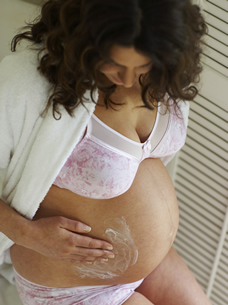In this article, you will find:
How pregnancy affects your skin
Many women look and feel better than ever during pregnancy, while those less fortunate report that there is a downturn in their appearance. However pregnancy affects you, the changes will be temporary and you'll be back to your normal self soon after the birth.
You may find that your skin looks better in pregnancy due to hormonal changes, mild fluid retention, and increased blood flow. These can all result in smoother skin and are responsible for the famous "pregnancy glow." On the other hand, you may find that your skin gets drier and more pimply and you may need to take extra care of it during pregnancy.
Skin also tends to darken during pregnancy, although the cause for this is unknown. One possible explanation is the increased levels of estrogen and melanocyte-stimulating hormone, which stimulate skin pigmentation.
Many women develop stretch marks during pregnancy, which can occur on bellies, breasts, hips, or legs. These initially appear as pink or purple lines and may be quite itchy. After pregnancy they fade into pale wrinkles. Nobody knows for sure why these occur, but they probably result from a combination of pregnancy hormones and your skin stretching. You're more likely to get stretch marks if you're very young, if you gain a lot of weight in pregnancy, or if you have a very big baby. There is less agreement about the role of other factors such as a family history, being very overweight before pregnancy or belonging to a particular ethnic group.
Many creams, lotions, and oils have been marketed for the prevention or treatment of stretch marks but none has been proven to work. Studies have shown that some creams containing ingredients such as vitamin E, elastin, collagen-elastin hydrolysates, and menthol can reduce the development of stretch marks; but other trials have shown that creams containing vitamin E had no effect. If you want to use a commercially recommended cream, lotion, or oil, they are safe to use and may help prevent stretch marks, but unfortunately there is no guarantee.
Chloasma
This describes the increased pigmentation of the cheeks, nose, and chin that affects around 50-70 percent of pregnant women. Using a protective sunscreen and avoiding the use of any photosensitizing skin-care products may reduce chloasma. A recent study found that using a highly protective sunscreen (SPF 50 and UVA-PF 28) prevented most pregnant women from developing chloasma.

